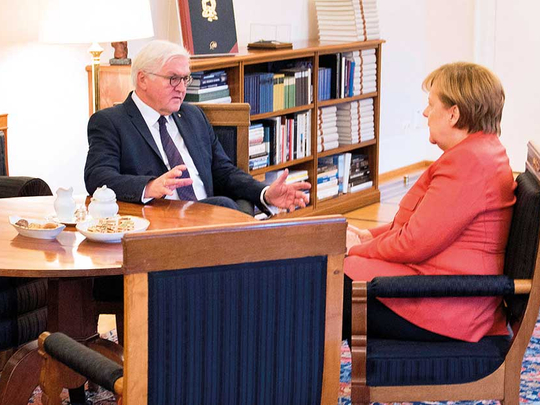
Brussels: The collapse of German Chancellor Angela Merkel’s talks to form a three-way coalition government is “bad news for Europe” given the leading role of the European Union’s biggest member state, the Dutch foreign minister said on Monday.
Germany’s political crisis was weighing on the euro and European shares after the pro-business Free Democrats (FDP) unexpectedly pulled out on Sunday from weeks of talks with Merkel’s conservatives and the ecologist Greens.
“It’s bad news for Europe that the government in Germany will take a little longer,” new Dutch Foreign Minister Halbe Zijlstra said on arrival for talks with EU peers in Brussels.
“Germany is a very influential country within the EU so if they don’t have a government and therefore don’t have a mandate it’ll be very hard for them to take positions.” Germany’s outgoing EU Minister Michael Roth, a member of the Social Democrats who are not in talks on forming a new Merkel government, said: “We all have an interest in getting a mandate so that we are able to take care fully of business in Europe.” “We have never had such a situation in Germany. So, given the collapse of these exploratory talks, we will need to assess the situation and decide accordingly.” The spokesman for the EU’s executive arm in Brussels stressed the need for stability in Germany, as did an official in French President Emmanuel Macron’s office.
“We are confident that the German constitutional process will provide the basis for the stability and continuity that has been a trademark of German politics and we hope this time will not be different,” said the European Commission’s Margaritis Schinas.
- Halbe Zijlstra | Dutch Foreign Minister
While some in Germany spoke of a possible new election, Zijlstra said that was a bad idea and noted that the Dutch government took seven months to form, which meant German parties could still return to talks after a pause.
Foreign Minister Didier Reynders of Belgium, which was without a government for 18 months after an election, sought to strike a lighter tone on Germany.
“In Belgium we have a tradition to do that, sometimes it’s very long,” Reynders told reporters.
Zijlstra did not think the situation in Germany affected the Brexit talks specifically for now, as the EU was “waiting for a substantial offer from the British” on the exit bill. Both Roth and Reynders agreed London must make a move on the money now.
Arriving at the same talks, the Czech Republic’s EU minister, Ales Chmelar, said: “We are hopeful that we will have a strong government in Germany sooner rather than later.”
Efforts to form a three-way coalition government have failed, Chancellor Angela Merkel said on Monday, pitching Germany into its worse political crisis for decades, raising the prospect of fresh elections and casting doubt over her future.
- Michael Roth | Germany’s EU Minister
The pro-business Free Democrats (FDP) withdrew from talks after more than four weeks of fruitless negotiations with Merkel’s conservative bloc and the environmentalist Greens, saying there was not enough common ground.
With German leadership seen as crucial for a European Union grappling with governance reform and Britain’s impending exit, FDP leader Christian Lindner’s announcement that he was pulling out spooked investors and sent the euro falling.
A tired-looking Merkel said she would stay on as acting chancellor and consult President Frank-Walter Steinmeier on how to move forward. A deal had been within reach, she said.
Steinmeier, who in the ordinary course of events is meant to play a non-partisan role above the cut-and-thrust of party politics, was due to give a statement at 1330 GMT.
“It is a day of deep reflection on how to go forward in Germany,” Merkel told reporters. “As chancellor, I will do everything to ensure that this country is well managed in the difficult weeks to come.” The failure of coalition talks is unprecedented in Germany’s post-war history, and was likened by newsmagazine Der Spiegel to the shock election of US President Donald Trump or Britain’s referendum vote to leave the EU — moments when countries cast aside reputations for stability built up over decades.
The collapse came as a surprise since the main sticking points — immigration and climate change policy — were not seen as FDP signature issues.
Green politician Michael Kellner accused Lindner of “bad theatrics”, one of many who suggested the liberal, pro-business party had never been serious about negotiating.
“It is better not to rule than to rule the wrong way.
Goodbye!” Lindner said, announcing his withdrawal in the small hours, blaming the breakdown on a lack of progress on education and tax policy — areas that had been seen as less contentious.
“Christian ‘Better no deal than a bad deal’ Lindner — Germany’s Boris Johnson,” wrote political commentator Max Steinbeis on Facebook, comparing Lindner to the British foreign minister and Brexit campaigner who is widely seen by Germany’s political class as a dangerous and heedless loose cannon.












